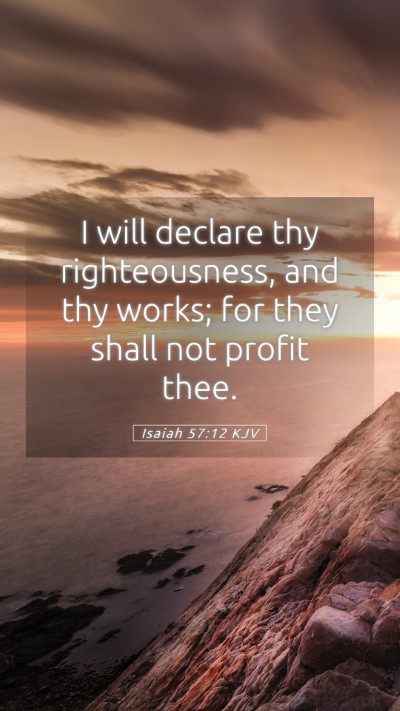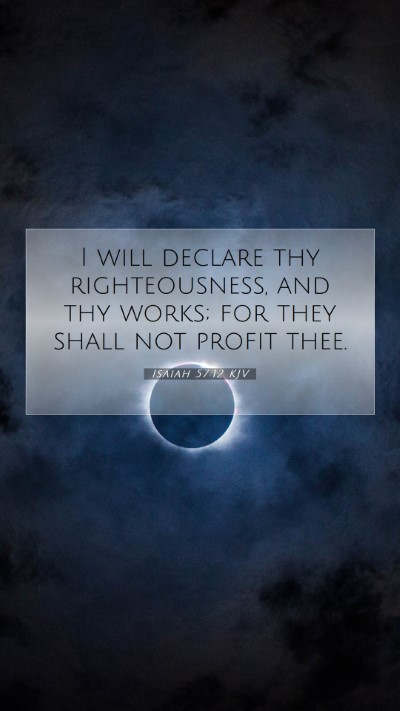Understanding Isaiah 57:12
Isaiah 57:12 states: "I will declare your righteousness and your works, for they will not profit you." This verse speaks to the futility of self-righteousness and the ineffectiveness of one's works outside of divine grace and acknowledgment.
Bible Verse Meanings and Insights
This scripture illustrates critical themes regarding human righteousness and reliance on God. Below is a combination of insights derived from public domain commentaries, specifically those by Matthew Henry, Albert Barnes, and Adam Clarke.
-
Matthew Henry's Commentary:
Henry explains that the Lord here points out the impotence of human efforts without divine influence. The verse serves to remind us that no amount of ritual or personal achievements can equate to the righteousness provided by God. Human works can be deceptive and lead individuals to a false sense of security.
-
Albert Barnes' Notes:
Barnes elucidates that this verse is part of a broader theme in Isaiah where God calls out Israel's misplaced trust in their accomplishments. He emphasizes that all human righteousness must be assessed in light of God's grace—showing that mere acts do not justify one before God.
-
Adam Clarke's Commentary:
Clarke highlights the need for God’s intervention in human attempts at righteousness. He outlines that this declaration serves as both a warning and an invitation—acknowledging one's shortcomings and seeking true redemption through faith rather than works.
Key Themes Explored
The exploration of Isaiah 57:12 brings forth several key theological themes that can enrich any Bible study group or online Bible study experience:
-
1. The Illusion of Self-Righteousness:
The verse underscores the reality that human righteousness is inadequate before God's standards. It invites readers to pursue a deeper relationship with God rather than relying solely on their actions.
-
2. God’s Declaration:
God's proclamation of righteousness and works emphasizes His role as the judge of human deeds. It serves as an invitation for self-examination about the motivations behind one's actions.
-
3. Works vs. Faith:
This verse forms a crucial basis for discussions on works and faith in Christian doctrine. It illustrates how, while good works are valuable, they must emerge from a relationship with God to hold true weight.
Application of the Verse
To apply the teachings of Isaiah 57:12 in daily life involves recognizing the limitations of personal righteousness. Believers are encouraged to:
- Engage in Bible study lessons that focus on grace and faith.
- Reflect on personal motivations for righteousness and ensure they align with God's will.
- Participate in Bible study groups where discussions can foster understanding of the fragility of human accomplishments compared to divine grace.
In-Depth Bible Verse Analysis
This verse presents an excellent opportunity for Biblical exegesis—breaking down the text and examining its implications for both ancient Israel and contemporary believers. Historical and cultural contexts reveal how reliance on rituals and physical acts was a common challenge for God’s people.
Cross References
Related scriptures provide additional depth to the interpretation of Isaiah 57:12:
- Romans 3:20: "For by works of the law no human being will be justified in his sight..."
- Ephesians 2:9: "...not a result of works, so that no one may boast."
- Philippians 3:9: "...and be found in him, not having a righteousness of my own that comes from the law..."
Conclusion
In summary, Isaiah 57:12 serves as a crucial reminder for believers on the importance of divine grace over self-derived righteousness. It invites introspection and paves the way for richer discussions in Bible study groups and Bible study resources. Understanding this verse not only deepens one’s faith but also enhances the ability to apply scripture meaningfully. The insights gleaned from public domain commentaries provide valuable frameworks for deeper exploration and application.


